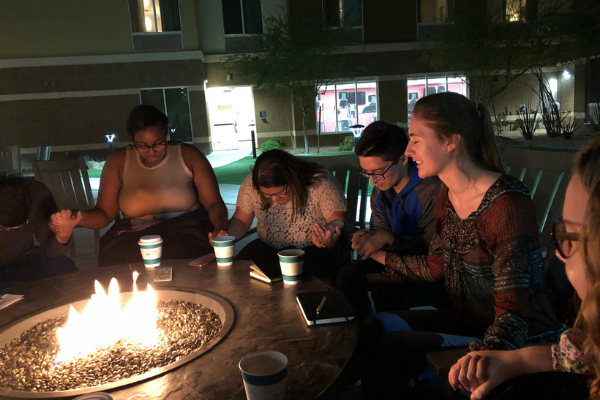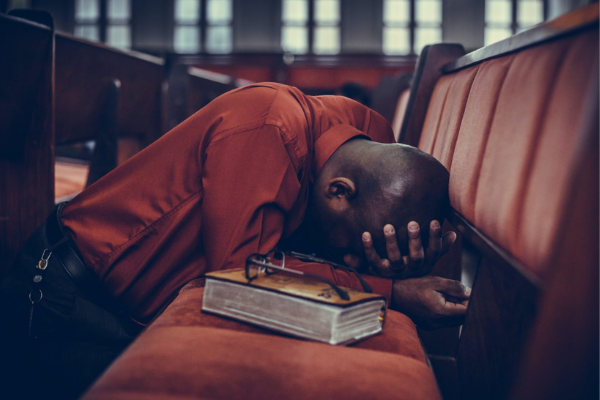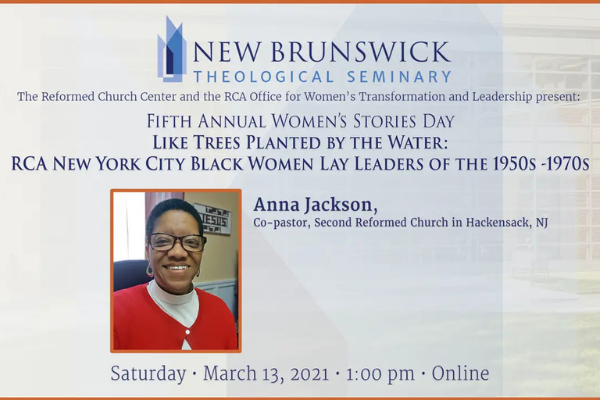The RCA is committed to working toward a multiracial and multicultural future freed from racism. This goal is named as a priority for Transformed & Transforming, the RCA’s vision statement. Dismantling racism is also central to one of the RCA’s doctrinal Standards, the Belhar Confession. We believe racism is sinful. And we are actively working to uncover and dismantle racism in ourselves and the systems we’re part of.
Dismantling Racism in the RCA
“The RCA commitment is to name racism as a sin, and to work against its prevalence and pervasiveness both within our relationships and our denominational system, and in the wider domestic and global communities. Our efforts at eradicating racism call for us to change not only our systems but also our hearts for each other and for the life matters that concern each other.”
—RCA general secretary’s interpretation, General Synod Council Ends Policy E-5
This work is informed by more than 60 years of guidance from General Synod, the broadest assembly in the RCA, which has repeatedly spoken against racism and the harm it does to God’s people, God’s church, and God’s world. General Synod has encouraged the church in general, and the RCA in particular, to repent of racism, and to stand in the gap and work toward equality. An antiracism policy, put forward in 2022 by the RCA’s Commission on Race and Ethnicity and adopted by General Synod, aims to establish dismantling racism work in all RCA entities.
Ways to get involved
1 Cor. 13 Project
At its heart, racism is a discipleship issue. The 1 Cor. 13 Project is rooted in discipleship. What are the ways that we need to reckon with our own failure to love others? How do we fall short of Christ’s love as a community? Racism is ultimately a failure of love. Founded by RCA minister Rev. Dr. Denise Kingdom Grier, this project shows the church a more excellent way that is grounded in Scripture.
Dismantling Racism Prayer Gatherings
Prayer intercessors are warmly welcomed to join us for our bi-monthly dismantling racism prayer gatherings on alternate Tuesdays, 1:30–2:30 p.m. Eastern. Gatherings are hosted by Rev. Nancy Boote, Rev. Dr. Micheal Edwards, Deacon Cynthia Peters, Rev. Dr. Joanne Van Sant, and other committed leaders. Contact Jeremy Simpson at jsimpson@rca.org to learn more.
Space for Non-Black People of Color/Ethnic Diversity
We all have our own part to play in the work of dismantling racism, but we don’t all have the same part or the same needs. Emerging from the work of the 1 Corinthians 13 project came a desire for non-Black people of color to explore and discuss how to contribute to dismantling racism in their own unique way. The equity-based hospitality and advocacy ministry teams will be providing listening space for Latino(a), Asian, Native American, and Multiracial ministry leaders to share history, current realities, and personal stories to discern the ways we are called to bring about racial justice in our own context. Contact Jeremy Simpson at jsimpson@rca.org if you’re interested.
Adopt an antiracism policy
General Synod 2022 adopted a recommendation from the Commission on Race and Ethnicity to urge all RCA entities to implement an antiracism policy, in which antiracism is defined as “the practice of confronting and changing policies, behaviors, and beliefs that perpetuate racist ideas and actions.” The policy declares racism as a sin, confesses that this sin has led to barriers that have caused separation and deprivation of rights, and commits to respect the rights and freedom of all people, to support allies, and to continue dismantling racist attitudes and structures.
Adopt the policy in your church, community, or assembly.
Resources
1 Corinthians 13 Bible Study
This Bible study invites you to consider the love described in 1 Corinthians 13 through the lens of race. You’ll grapple with America’s failure to love Black people and journey from unloving to loving through biblical study, personal reflection, and engagement with Black voices. This free Bible study is an excellent introduction to the 1 Cor. 13 Project.
Responding to Anti-Asian Hate and Standing with the AAPI Community
Bias, hate, and violence toward people of Asian descent have been on the rise since the start of the Covid-19 pandemic. The RCA stands with the AAPI community against this vitriol. The RCA first responded in April 2020 with a statement and collection of resources and stories focused on standing with Asians against racism and bias. In May 2021 the RCA renewed this call to stand with the AAPI community following a spate of violence toward people of Asian descent, including the slaying of eight people in Atlanta, Georgia. The RCA also re-published this statement of lament from the NCC in response to the Atlanta shootings in March 2021.
Prayers for Racial Harmony
You can draw on this collection of prayers to guide and inspire you as you pray for a multiracial and multicultural future freed from racism. Note that these prayers are not just asking for everyone to get along; justice and love pave the path to harmony.
Lament Toolkit
There are no easy answers or quick fixes to the sin of racism. And we cannot erase the pain and suffering racism has already caused. The practice of lament is a biblical way to respond to the pain of racism. This toolkit provides ways to practice lament on your own or as a church.
The Black Manifesto and the RCA
In 1969, James Forman and members of the Black Economic Development Conference issued the Black Manifesto, which called upon the RCA and other U.S. churches to take responsibility in the form of reparations for their role in slavery and segregation. Forman took over the denominational office in New York as a form of protest and later brought his message directly to the floor of General Synod. Forman’s challenge to the RCA ultimately led to the formation of the African American Black Council. The Reformed Church Center at New Brunswick Theological Seminary hosted an event in 2019 to relearn and reflect on how the RCA responded to the Black Manifesto 50 years after Forman brought it to the RCA.
Learn about the RCA’s response to the Black Manifesto.
Read the Black Manifesto.
Justice and Reconciliation Prayer Service Order of Worship
You may want to dedicate a worship service to praying for justice and reconciliation. Here’s a sample justice and reconciliation prayer service order of worship to use as a guide. Your worship planning team may use it in its entirety or to select the elements that work best in your context.
Asian, Latin American, and Black Reformed Theologians
Rev. Dr. J. Todd Billings, a professor of Reformed theology, curated this list of pastors and scholars of color who write about Reformed theology.
The Blanket Exercise
The Blanket Exercise is a 90-minute exercise that walks participants through the history of the relationships between Europeans and Indigenous nations. Developed by the Christian Reformed Church in North America, it is a practical, powerful, experiential way to understand Native peoples’ history in the Canadian and American contexts.
Denominational commissions and racial/ethnic councils
The RCA has four councils dedicated to representing members and congregations who belong to racial/ethnic communities. The Commission on Race and Ethnicity also advises the denomination on issues of race.
Commission on Race and Ethnicity
The Commission on Race and Ethnicity advises the church on policies and initiatives that address issues of institutional racism and the commitment of the RCA to become a fully multicultural and multiethnic denomination. It serves as an advocate for transformation of the RCA in regard to its multiracial and multiethnic life.
African American Black Council (AABC)
In addition to being the voice of African American and black congregants and congregations in the RCA, the AABC also advocates for policies of inclusion and economic, social, and racial justice.
Council for Hispanic Ministries
In addition to being the voice of Hispanic congregants and congregations in the RCA, the council also advocates for policies of inclusion and economic, social, and racial justice. All Hispanic RCA ministers of Word and sacrament, commissioned pastors, elders, and deacons are encouraged to join.
Council for Pacific and Asian American Ministries
In addition to being the voice of Pacific and Asian American congregants and congregations in the RCA, CPAAM also advocates for policies of inclusion and economic, social, and racial justice.
Native American and First Nations Ministries Council
The Native American Indian Council (NAIM) was recently reinstated as the RCA’s fourth ethnic council. NAIM gathers together RCA members and leaders from several different tribal contexts across North America. While NAIM is still discerning its focus and plans moving forward, the council’s first gathering offered an encouraging space for story sharing and prayerful reflection on what’s next.
Perspectives and stories

Confronting Racism and Its Ugly Past to Change the Future
Through the Robben Island Project, six college students explored intersections of racism, history, and their personal life journeys; developed their own leadership skills; experienced spiritual formation; and put together a project and process that they could bring back to their own context.

Calling, Leadership, the Black Church, and Soul Care: A Conversation with Earl James and Peter Watts
As Earl James prepared to retire as the RCA’s coordinator for advocacy and the African American Black Council and Pete Watts prepared to step into James’s shoes, they reflected on calling, their experiences as Black leaders, and the future of the church.
Stories of RCA Black Women Lay Leaders in New York City: 1960s-1980s
Rev. Anna Jackson shares her research on the leadership of Black lay women in the New York area within both the local church and the denomination during the 1960s through 1980s. As part of her research, she conducted oral interviews with several of the women and people who knew them. This video presentation was part of the Reformed Church Center 2021 Women’s Stories Day.

Is Racism a Discipleship Issue? This White Millennial Pastor Thinks So.
Joe Graham, a millennial pastor, discusses the work of dismantling racism and what it has to do with discipleship. Graham also explains why he decided to take this work seriously in his church, even though it meant upsetting some of the members.

A Call to Justice and Mercy
Rev. Dr. Patricia Sealy challenges the church to speak out with a prophetic voice for justice and mercy in response to racial injustice. Adapted from a sermon, this piece looks to the prophet Zechariah for a biblical model.

Growing A Healing Space Around Racial Trauma | An Excerpt from Trauma and Race: A Path to Wellbeing
Rev. Micah McCreary shares about a counseling session with a racially traumatized family that grew into a healing space. That experience—and advice from his supervisor—taught him the importance of being a healing presence and connecting with people seeking healing from racial trauma.

Address Racism One Step at a Time
Racism is hard and messy. It is a pervasive issue that not only exists in the world, in our country [the U.S.], in the church, but also in each of us. It is wrong. That is something we can hopefully all agree on. None of us want to be racist, and none of us want racism in our churches.

